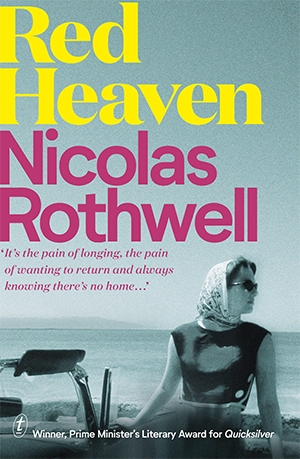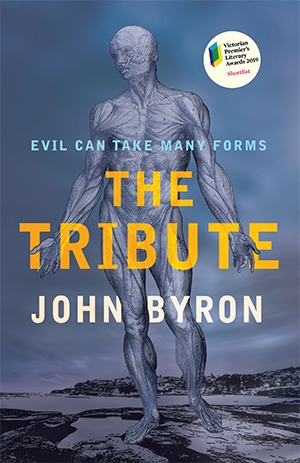Australian Fiction
Paul Giles reviews 'Red Heaven: A fiction' by Nicolas Rothwell
Nicolas Rothwell is perhaps best known as a critic of art and culture for The Australian, though he has also published several non-fiction books, one of which, Quicksilver, won a Prime Minister’s Literary Award in 2016. Red Heaven, subtitled a ‘fiction’, is only the second of Rothwell’s books not to be classified as non-fiction. Always straddling the boundary between different genres, Rothwell has cited in Quicksilver Les Murray’s similar defence of generic hybridity in Australia: the novel ‘may not be the best or only form which extended prose fiction here requires’. Working from northern Australia, and intent upon exploring how landscape interacts obliquely with established social customs, Rothwell, in his narratives, consistently fractures traditional fictional forms so as to realign the conventional world of human society with more enigmatic temporal and spatial dimensions.
... (read more)A man waits outside a schoolyard and watches a young girl who, it seems, is his daughter, though she doesn’t know him. What appears to be an internal dialogue between the man and the child’s mother commences, set apart from the main text. It is a self-conscious narrative manoeuvre. The narrator, Jules Pyatt, after all has a thesis in English literature behind him (abandoned). He knows what narrative is all about, and he knows he wants to tell the story of his ‘Tazyrik year’, which belongs to a period several years before, when he was in his late twenties.
... (read more)By the end of Hugh Breakey’s The Beautiful Fall (Text, $32.99 pb, 349 pp), it is hard to remember that the prologue hinted at stimulating possibilities. In it, Robbie’s past self writes to his present one, explaining that he suffers from recurring amnesia, which strikes every 179 days. Readers could be mistaken for thinking they are in for meditations on time and memory, maybe even on the meaning of a life lived episodically. When it is revealed that Robbie is building an intricate arrangement of 83,790 dominoes in his living room, readers might even imagine a novel that touches on metaphysical themes in the vein of Jorge Luis Borges.
... (read more)In an ABC interview to promote his previous novel, Fever of Animals (2015), Miles Allinson shares a brief anecdote. When Allinson was aged sixteen or seventeen, a teacher told him that everyone turns conservative eventually. Allinson recalls his repulsion at the notion of this inevitable slide towards orthodoxy. His new novel, In Moonland, feels like a rebuttal. Joe, the narrator of the first part of the book, is caught somewhere between consent and revolt: though ambitious, he feels trapped by the flickering lights of his own computer, by the suburbs, and by his run-of-the-mill job. Orbiting him is a coterie of questions relating to his new status as a father, coupled with one more profoundly unanswerable question: why did his father, Vincent, kill himself? Only some of these questions are answered across a narrative that uses four different perspectives and three different timelines, from the present back to the 1970s and into the near future.
... (read more)Halfway through Lucy Neave’s new novel Believe in Me, there is an astonishing scene in which an orphaned foal is dressed in the skin of a newly dead foal, the skewbald coat threaded with baling twine and the strings knotted under the throat and chest. Disguised in this fleshy coat, strands of bloody muscle still clinging to it, the foal is presented hopefully to its foster mother. The novel’s main protagonist, Bet, is sceptical: ‘It’s condescending: as if a mare could be fooled by putting her dead foal’s skin on another foal.’ Sure enough, the grieving mare rejects the starving foal, stamping her hooves and moving around uneasily in the stable. Later that night, when Bet goes to check on the animals, she finds them nestled together: ‘Dark shapes, they moved together, away from me, as though they’d been startled from a dream.’ Stunned at this unexpected communion, Bet retreats into her own solitude: ‘I turned off the light, bolted the door and walked back through dew-soaked grass to bed, seeing again the mare and foal, nose to tail. They had no need of me.’
... (read more)There is something, or rather someone, in the air in Jennifer Mills’s dark fourth novel. The Airways represents another leap towards the uncanny for Mills, whose previous book, the Miles Franklin-shortlisted Dyschronia (2018), was already a departure from the more traditionally realist modes of her earlier novels, The Diamond Anchor (2009) and Gone (2011), and short story collection, The Rest Is Weight (2012).
... (read more)Three experimental novels by Angela O’Keeffe, Michael Burrows, and Martin McKenzie-Murray
Writers seeking publication are often advised to have an ‘elevator pitch’ ready. These succinct book-hooks are designed to jag a trapped publisher in the wink between a lift door closing and reopening. Has this insane tactic ever actually worked? No idea. But it’s fun to imagine the CEO of Big Sales Books, on their way up to another corner-office day of tallying cricket memoir profits, blindsided by three of the looniest elevator pitches imaginable. A novel narrated by Jackson Pollock’s Blue Poles! A faux political memoir about a prime minister and his shark vendetta! An academic satire cum historical mystery mashup told largely through the – wait, wait, wait! – footnotes of a PhD thesis! That CEO will probably take the stairs next time, but kudos to the independent publishers who saw the potential in these experimental works and their début authors. Whatever the path of weird Australian writing, long may it find its way to these pages.
... (read more)Shannon Burns reviews 'The Other Half of You' by Michael Mohammed Ahmad
Bani Adam returns as the narrator–protagonist of Michael Mohammed Ahmad’s The Other Half of You, a sequel to his two previous books. The most recent one, The Lebs (2018), gave us the story of Bani’s teenage years at Punchbowl Boys’ High School: the trials of a Lebanese Muslim boy in a majority Lebanese Muslim community nestled inside the larger, diverse territories of Western Sydney, in post-‘War on Terror’ Australia. The Other Half of You is an account of Bani’s late teens and early twenties, and of an inner conflict between religious, cultural, and romantic pieties.
... (read more)The Tribute begins with a corpse. And not just any corpse. This body is discovered in a Sydney terrace house with its organs removed. One detective describes the crime as ‘butchery’, and that’s an understatement. This murder is the work of Stephen Porter, a deceptively bland chap who uses his bank job to secure the schedules and addresses of victims. These victims are then dissected as ‘tributes’ to the Fabrica, a collection of sixteenth-century anatomy books.
... (read more)‘And what is wrong with sad stories? The world is always sad.’ So advises Little Red, the aged, marginalised, knowing female character in the title story of Tony Birch’s latest short fiction collection. As in Birch’s previous works, Dark as Last Night contains an abundance of sad stories, but with grief and trauma ameliorated by the main protagonist’s affection for at least one other character, be it a family member or neighbour.
... (read more)







